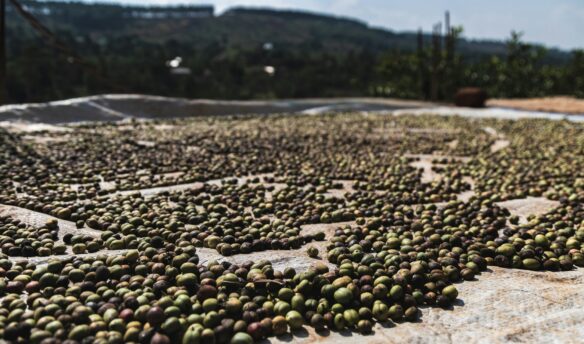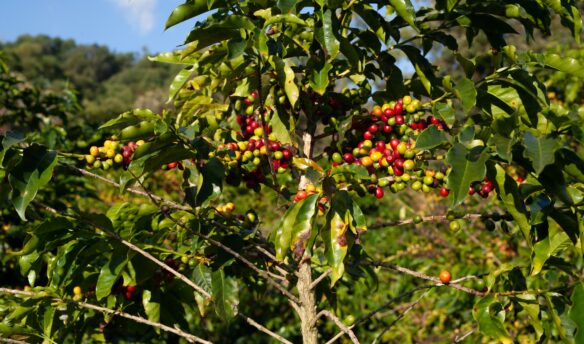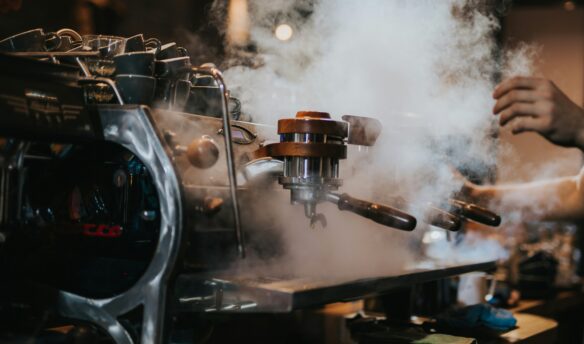No more flat whites? Australian coffee shops feel the effects of inflation. Plus, Ethiopia looks to China to boost coffee exports and forget pesticides—to manage the coffee berry borer in Hawaii, just keep harvesting!
‘Ethiopian Coffee Exporters Enjoy Growing Demand in China’ – via Xinhua
“Over the last 5 to 10 years, we are seeing growing demand for Ethiopian coffee in China and that has created one of the most promising coffee markets in the world,” said coffee exporter Abdullah Bagersh of S.A. Bagersh Private Limited Company.
China’s annual coffee consumption has grown by 15 percent over the past decade, compared to the international growth rate of 2.2 percent. Combined with the country’s deepening relationship with the entire continent of Africa broadly, has made China a potentially lucrative market. “We participated in the second China-Africa Economic and Trade Expo last year,” said Jemal Abrar from Mullege Coffee Export in Ethiopia. “Since then, we have enjoyed growing market share in China and exploited new market opportunities.”
Export volume from Ethiopia has increased in the last three years, making China the seventh-largest importer of Ethiopian coffee. The Ethiopian Coffee Association is working with the Chinese government and the Ethiopian Embassy in Beijing to help exporters “better exploit the Chinese market through online meetings and aggressive promotion.”
In 2022, the United Nations Economic Commission for Africa and the Ethiopian Government worked together to launch Ethiopian coffee on Alibaba, China’s largest e-commerce platform. During the launch, the platform sold 11,200 bags of roasted Ethiopian coffee in one second.
‘Ground Down: Australia Coffee Shops an Early Inflation Casualty’ – via Reuters
Australia’s coffee industry is world-renowned and much-copied but hasn’t been immune from the effects of global inflation and the cost of living crisis. Rising overhead costs and shrinking disposable incomes have combined to squeeze profits and force many coffee shops out of business.
The Australian cafe industry is worth $6.6 billion. Per capita, Australia has the largest coffee market outside Europe, and the country’s coffee culture is often held up as the best in the world. Yet according to Reuters, it is facing “a perfect storm of rising utility bills, produce costs, wages and rents plus a slowdown in discretionary spending brought on by interest rate hikes.”
According to a Reuters analysis, the cost of making a flat white has increased by nearly 20%, while producing a steak sandwich has risen about 16% over the past two years. These increases have eaten into cafe profits and left many business owners looking for an out.
“The cost of living started to bite, especially on people who used to come in for a daily meal,” said Jack Hanna, owner of The Goodsline Cafe in Sydney, which closed just two years after opening. “People are just not willing to spend money on discretionary items when the supermarket also costs quite a lot. We had to increase our prices and pay staff a living wage.”
Many sources quoted in this article mention rising wages and low unemployment as additional pressures adding to their woes and fueling inflation. “People are starting to panic with increased electricity, wages, rent,” said Guy Cooper from Link Business Sales Australasia. This is a line repeated by the head of the Reserve Bank of Australia (and by heads of the Bank of England and the US Federal Reserve)—even though the Organisation for Economic Co-operation and Development has said that Australia’s rising inflation is due mainly to corporate profiteering. In Australia, workers experienced a real wage decline of 4.5% in 2022, the largest on record.
High energy prices are certainly playing a role, as are rent and mortgage increases and third-party delivery service fees. And many customers simply can’t afford to spend money in cafes. As one cafe owner notes, “Some of my regulars I used to have will still come and get coffee and say, ‘We had to bring lunch. We just brought it in from home.'”
‘Frequent Harvesting Proves Optimal for Managing Coffee Berry Borer in Hawaii’ – via Entomology Today
The coffee berry borer (CBB) continues to devastate Hawaiian farms, even as farmers and authorities attempt to fight back. Increased insecticide and pesticide use is one option, while some farmers are due to release tiny parasitic wasps any day now.
Another technique proposed by researchers from the US Department of Agriculture and the Synergistic Hawaii Agriculture Council is cultural control-focused management: field sanitation, frequent harvesting, and strip-picking with relatively little applied pesticide. While this technique is known to be effective against CBB, the costs and benefits of such practices have until now not been examined for Hawaii.
The beetle spends most of its life within the coffee fruit, where it is protected from sprays and other enemies, and each berry can contain hundreds of CBB—pesticide application must be carefully timed to catch the adult female as it flies between berries looking for a new home.
On the other hand, frequent harvesting removes CBB from the farm entirely. “By frequent removal of coffee fruits from farms, growers can disrupt the life cycle of CBB and ensure that they start the new season with low infestation,” research biologist Melissa A Johnson writes.
Johnson and colleagues published a study in March that compared two CBB management strategies across ten Hawaiian coffee farms: conventional techniques with frequent pesticide spraying and cultural control-focused management. “Over two consecutive coffee seasons, farms that used a combination of frequent harvesting and few pesticide applications exhibited significantly lower CBB infestation, better harvesting efficiency, higher harvested yields, higher quality of processed dried coffee, and higher net profits from the sale of harvested coffee compared to that of conventionally managed farms,” Johnson writes.
The argument against increased harvesting, pruning, and sanitation is due to labor costs: Hawaii has some of the highest coffee worker wages in the world. The researchers found, however, that farms using the cultural control methods saw net profits increase 48 percent while chemical control costs fell 55 percent. The study notes that “the cost of frequent and efficient harvesting is lower than that of chemical controls when the profit earned from sale of the collected cherry is considered.”
More News
‘”I Taste So Good!” Juanita MORE! Cold Brew At San Francisco’s Ritual Coffee‘ – via Sprudge
‘Catalyst Trade Hosting Inaugural Ethiopian Innovation Lots Auction‘ – via Daily Coffee News
‘Climate Change Means Coffee Market Volatility Is Likely to Continue, Lavazza Says‘ – via Wall Street Journal
‘Taiwanese Pop Star Jay Chou’s Mom to Pocket $54 Million With Coffee IPO‘ – via Bloomberg
‘Beanless RTD Coffee Brand Minus Receives New Round Of VC Investment’ – via Sprudge
‘Costa Coffee Enters Uzbekistan With Tashkent Store‘ – via World Coffee Portal
‘Erwin Mierisch Named Executive Director of ACE and Cup of Excellence‘ – via Daily Coffee News
The Week in Coffee Unionizing
- A worker at Kalamazoo Coffee Company in Michigan was allegedly retaliated against for seeking union representation. The worker was placed on leave and eventually fired after approaching his local union over safety concerns. The International Brotherhood of Electrical Workers Local 131 contacted the company and asked it to join the union, and an hour later, the employee was placed on leave. “This was an explicit punishment for seeking representation,” a charge filed with the National Labor Relations Board on behalf of the employee reads.
- Starbucks Workers United is embarking on a 13-city bus tour to promote unionization at the company, and baristas are handing out flyers to customers encouraging them to organize their own pickets of non-union Starbucks locations. The flyers advertise a “national ‘Adopt-a-Store’ day of action” on August 7th, according to Reuters. “If Starbucks won’t come to the table, then we’re going to come to them,” said organizer Michelle Eisen in a statement. “It’s time this company learns that union-busting is unacceptable, and our allies and customers are not going to accept it.”
- A National Labor Review Board judge has ordered Starbucks to reopen a location in Ithaca, New York, that the company closed in June 2022, and reinstate store employees. The judge found that Starbucks violated federal labor law multiple times and noted that the store’s closure was “done in large part to discourage unionization efforts in Ithaca and elsewhere.” The company said it “strongly disagrees” with the ruling and will contest the results.
- The prospective new owner of the troubled Little Dog Coffee Shop in Maine is crowdfunding to try to reopen. The cafe closed after a series of union strikes responding to then-owner Larry Flaherty’s refusal to bargain and persistent issues with maintenance and staffing. A local resident named Raffi Sulahian purchased the cafe’s equipment from Flaherty and is trying to reopen the business—however, he’s relying on a GoFundMe to raise funds. Sulahian would not say whether he plans to rehire the former workers. However, in a May letter to the editor in the Portland Press Herald, he was less than positive on the subject of unions: “Who’s raising this dysfunctional, traumatized, anxiety-ridden generation, who needs safe spaces and trigger warnings to get through their days? What’s undeniable is that these misguided employees and their union should be condemned for this abuse of the collective bargaining system meant to protect employee rights.” The GoFundMe has raised just $3,000 of its $50,000 goal.
Beyond the Headlines
‘Savor Your Coffee; Someone Probably Lost Sleep Over It’ by Nic Neves
‘Are There Really Mycotoxins In My Coffee?’ by Liz Clayton
‘Camp Coffee, Colonialism, and the Evolution of a Brand’ by Fionn Pooler















